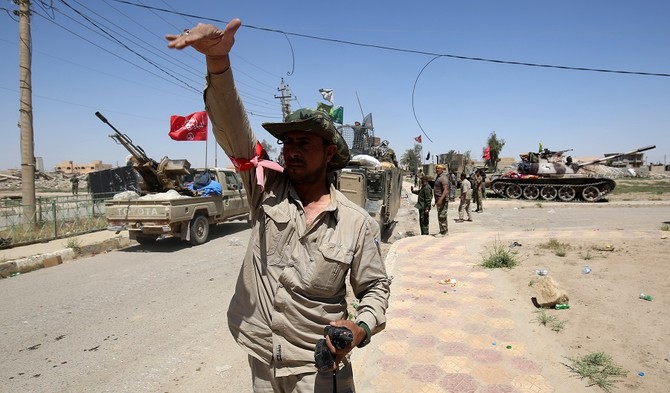BAGHDAD: Iraqi armed factions said Thursday they have launched dozens of missiles targeting Daesh militants holed up in a Syrian village across the border.
The state-sanctioned Popular Mobilization Forces said they fired 50 missiles at targets in Baghouz village, in the last speck of territory held by the extremists.
The Britain-based Syrian Observatory for Human Rights also reported shelling from the Iraqi side but had no details on casualties.
Iraq’s military has bombed Daesh posts inside Syria before, but the militias — many of which are backed by Iran — rarely engage in cross-border shelling. The militias’ social media account claimed to have shelled inside Syria last on Feb. 1.
Daesh claims to have downed a PMF-operated drone in Baghouz on Wednesday.
Some PMF factions are fighting inside Syria.
Daesh has lost virtually all the territory it once held in Syria and Iraq. Hundreds of militants are now confined to a small area where they are surrounded by Syrian fighters backed by US-led airstrikes.
US President Donald Trump said the militants will have lost all their territory by next week. He said the US will not relent in fighting remnants of the extremist organization despite his decision to withdraw American troops from Syria over the objections of some of his top national security advisers.
The US-backed fighters on the front lines have slowed operations in recent days to allow civilians to leave the Daesh-controlled area, but the Observatory said heavy fighting and coalition airstrikes have resumed in the last 24 hours. It said the militants have planted large numbers of land mines to slow the advance.
Over 37,000 people, including over 3,000 militants, have exited the crumbling Daesh territory since December. Many of those fleeing are foreigners, the Observatory reported.


Iraqi armed factions hit Daesh targets inside Syria
Iraqi armed factions hit Daesh targets inside Syria

- Daesh has lost virtually all the territory it once held in Syria and Iraq
- Hundreds of militants are now confined to a small area where they are surrounded by Syrian fighters backed by US-led airstrikes
Lebanon’s Berri says parliamentary election must be held on time
BEIRUT: Lebanese Parliament Speaker Nabih Berri said on Friday he was committed to holding a parliamentary election as scheduled on May 10, despite calls from some politicians to postpone the vote.
Several politicians have called for a delay, citing security concerns in southern Lebanon, where Israel has carried out air strikes targeting Hezbollah.
Berri, a Shiite leader allied with Hezbollah, said in a statement carried by the state-run National News Agency that he had informed President Joseph Aoun and the government of his position.
“It is not permissible that, at the start of a new era, we obstruct its launch by disrupting, postponing or extending the most important constitutional entitlement, which is the foundation for forming authorities and producing political life,” Berri said.
Berri has opened the candidacy registry for the election and submitted the first nomination request for the Tyre-Zahrani district in southern Lebanon.
Lebanon last held a parliamentary election in May 2022, a vote marked by low turnout and deep public anger over a financial collapse. The election saw some gains by reformist candidates emerging from the 2019 protest movement, while the Iran-backed Hezbollah and its allies lost their parliamentary majority. (Reporting by Laila Bassam; Writing by Tala Ramadan; Editing by Sharon Singleton)
Several politicians have called for a delay, citing security concerns in southern Lebanon, where Israel has carried out air strikes targeting Hezbollah.
Berri, a Shiite leader allied with Hezbollah, said in a statement carried by the state-run National News Agency that he had informed President Joseph Aoun and the government of his position.
“It is not permissible that, at the start of a new era, we obstruct its launch by disrupting, postponing or extending the most important constitutional entitlement, which is the foundation for forming authorities and producing political life,” Berri said.
Berri has opened the candidacy registry for the election and submitted the first nomination request for the Tyre-Zahrani district in southern Lebanon.
Lebanon last held a parliamentary election in May 2022, a vote marked by low turnout and deep public anger over a financial collapse. The election saw some gains by reformist candidates emerging from the 2019 protest movement, while the Iran-backed Hezbollah and its allies lost their parliamentary majority. (Reporting by Laila Bassam; Writing by Tala Ramadan; Editing by Sharon Singleton)
© 2026 SAUDI RESEARCH & PUBLISHING COMPANY, All Rights Reserved And subject to Terms of Use Agreement.












